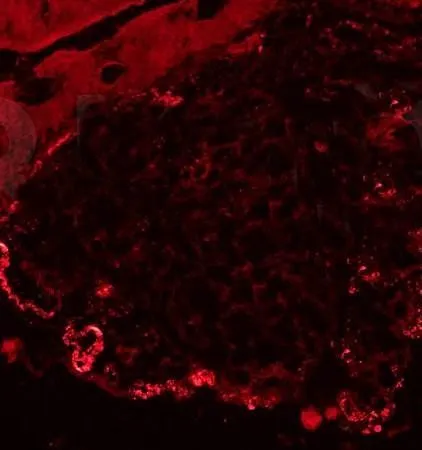![IHC-P analysis of human renal cell carcinoma tissue using GTX34730 Fibronectin antibody [568]. IHC-P analysis of human renal cell carcinoma tissue using GTX34730 Fibronectin antibody [568].](https://www.genetex.com/upload/website/prouct_img/normal/GTX34730/GTX34730_20200115_IHC-P_1070_w_23060801_772.webp)
IHC-P analysis of human renal cell carcinoma tissue using GTX34730 Fibronectin antibody [568].
Fibronectin antibody [568]
GTX34730
ApplicationsFlow Cytometry, ImmunoFluorescence, ImmunoCytoChemistry, ImmunoHistoChemistry, ImmunoHistoChemistry Paraffin
Product group Antibodies
TargetFN1
Overview
- SupplierGeneTex
- Product NameFibronectin antibody [568]
- Delivery Days Customer9
- Application Supplier NoteICC/IF: 1-2microg/ml. IHC-P: 1-2microg/ml for 30 minutes at RT. FACS: 1-2microg/106 cells. *Optimal dilutions/concentrations should be determined by the researcher.Not tested in other applications.
- ApplicationsFlow Cytometry, ImmunoFluorescence, ImmunoCytoChemistry, ImmunoHistoChemistry, ImmunoHistoChemistry Paraffin
- CertificationResearch Use Only
- ClonalityMonoclonal
- Clone ID568
- Concentration0.2 mg/ml
- ConjugateUnconjugated
- Gene ID2335
- Target nameFN1
- Target descriptionfibronectin 1
- Target synonymsCIG, ED-B, FINC, FN, FNZ, GFND, GFND2, LETS, MSF, SMDCF, fibronectin, cold-insoluble globulin, epididymis secretory sperm binding protein, lnc-ABCA12-8, migration-stimulating factor
- HostMouse
- IsotypeIgG1
- Protein IDP02751
- Protein NameFibronectin
- Scientific DescriptionThis gene encodes fibronectin, a glycoprotein present in a soluble dimeric form in plasma, and in a dimeric or multimeric form at the cell surface and in extracellular matrix. The encoded preproprotein is proteolytically processed to generate the mature protein. Fibronectin is involved in cell adhesion and migration processes including embryogenesis, wound healing, blood coagulation, host defense, and metastasis. The gene has three regions subject to alternative splicing, with the potential to produce 20 different transcript variants, at least one of which encodes an isoform that undergoes proteolytic processing. The full-length nature of some variants has not been determined. [provided by RefSeq, Jan 2016]
- Storage Instruction-20°C or -80°C,2°C to 8°C
- UNSPSC12352203


![WB analysis of 25 ug of human plasma lysates using GTX15737 Fibronectin antibody [3F12]. Dilution : 1:300](https://www.genetex.com/upload/website/prouct_img/normal/GTX15737/GTX15737_1519_WB_w_23060620_400.webp)
![ELISA analysis of antigen using GTX60571 Fibronectin antibody [2F4G2]. Black : Control antigen 100ng Purple : Antigen 10ng Blue : Antigen 50ng Red : Antigen 100ng](https://www.genetex.com/upload/website/prouct_img/normal/GTX60571/GTX60571_20170912_ELISA_w_23061123_827.webp)
![IHC-P analysis of human pancreatic adenocarcinoma tissue using GTX34725 Fibronectin antibody [HFN7.1].](https://www.genetex.com/upload/website/prouct_img/normal/GTX34725/GTX34725_20200115_IHC-P_908_w_23060801_383.webp)
![IHC-P analysis of human pancreatic adenocarcinoma tissue using GTX34726 Fibronectin antibody [SPM539].](https://www.genetex.com/upload/website/prouct_img/normal/GTX34726/GTX34726_20200115_IHC-P_910_w_23060801_579.webp)
![IHC-P analysis of human pancreatic adenocarcinoma tissue using GTX34728 Fibronectin antibody [SPM246].](https://www.genetex.com/upload/website/prouct_img/normal/GTX34728/GTX34728_20200115_IHC-P_909_w_23060801_741.webp)
